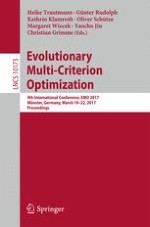2017 | OriginalPaper | Buchkapitel
Empirical Investigations of Reference Point Based Methods When Facing a Massively Large Number of Objectives: First Results
verfasst von : Ke Li, Kalyanmoy Deb, Tolga Altinoz, Xin Yao
Erschienen in: Evolutionary Multi-Criterion Optimization
Aktivieren Sie unsere intelligente Suche, um passende Fachinhalte oder Patente zu finden.
Wählen Sie Textabschnitte aus um mit Künstlicher Intelligenz passenden Patente zu finden. powered by
Markieren Sie Textabschnitte, um KI-gestützt weitere passende Inhalte zu finden. powered by
